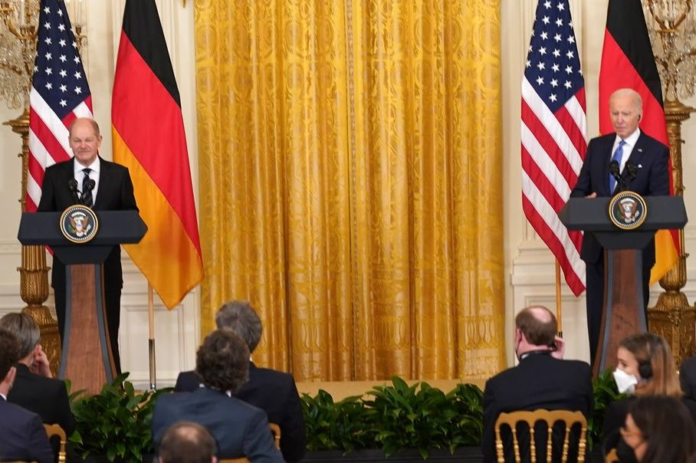German Chancellor Olaf Scholz participates with U.S. President Joe Biden (R) in a joint press conference with in the East Room of the White House on Monday, February 7, 2022. He will return to the White House in March. File Photo by Leigh Vogel/UPI | License Photo
Feb. 16 (UPI) — The White House announced Thursday that German Chancellor Olaf Scholtz will visit the White House on March 3, coming shortly after the first anniversary of Russia’s invasion of Ukraine. The United States and Germany have recently committed their most advanced tanks to Ukraine in the defense of the country and are involved in sanctions of Moscow for its war, which started on Feb. 24, 2022. Advertisement
“The chancellor’s visit is an opportunity to reaffirm the deep bonds of friendship between the United States and our NATO ally Germany,” White House Press Secretary Karine Jean-Pierre said in a statement.
“At the one-year mark of Russia’s brutal invasion of Ukraine, the leaders will discuss our ongoing efforts to support Ukraine, impose costs on Russia for its aggression, and strengthen transatlantic security.”
RELATED Severed communication line grounds Lufthansa flights
Last month, both countries agreed to send tanks to Ukraine after much debate with NATO allies about assisting Kyiv without enflaming the conflict with Moscow. Germany has been criticized for its measured response in helping in the Russia-Ukraine war.
It will be Scholz’s first visit to the White House as chancellor since February 2022. He replaced longtime German leader Angela Merkel a little more than a year ago.
Advertisement
“They will also review our continued cooperation on a range of regional and global security issues, including working together on shared challenges posed by China and our cooperation in the Indo-Pacific, Jean-Pierre said.
On Wednesday, NATO countries announced more than $624 million to support Ukraine, while the United Nations called for $5.6 billion in aid packages to support food, healthcare and other assistance to those affected by the war.
The U.N. effort includes $3.9 billion for the Humanitarian Response Plan for Ukraine and $1.7 billion for the Refugee Response Plan.




